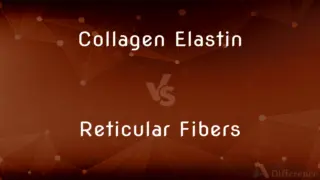Organic Farming vs. Chemical Farming — What's the Difference?
By Tayyaba Rehman — Published on November 23, 2023
Organic Farming uses natural methods and substances, avoiding synthetic inputs, while Chemical Farming relies on synthetic fertilizers and pesticides for crop production.

Difference Between Organic Farming and Chemical Farming
Table of Contents
ADVERTISEMENT
Key Differences
Organic farming encompasses practices that primarily depend on the ecosystem's natural balance. On the other hand, chemical farming often deploys synthetic chemical fertilizers to enhance soil fertility.
Organic farming leans towards employing natural processes, crop rotations, and mechanical cultivation to maintain soil productivity and control pests. Chemical farming prioritizes achieving higher productivity and often resorts to using various chemical pesticides to safeguard crops from pests and diseases.
Moreover, organic farming restricts or strictly limits the use of synthetic fertilizers, pesticides, and genetically modified organisms (GMOs).The sustainability of chemical farming might be queried due to its potential environmental impact, especially regarding chemical runoff into water bodies.
Comparison Chart
Fertilizer Usage
Utilizes natural fertilizers like manure.
Employs synthetic, chemical fertilizers.
Pest Control
Uses natural predators or organic pesticides.
Utilizes synthetic chemical pesticides.
ADVERTISEMENT
Environmental Impact
Often considered eco-friendly.
Can be harmful to the environment.
Crop Varieties
Primarily uses traditional or non-GMO seeds.
May use GMOs and hybrid seeds.
Cost
Typically incurs higher costs.
Often comparatively less expensive.
Compare with Definitions
Organic Farming
Farming that strictly limits synthetic inputs.
The practice of organic farming can enhance biodiversity in agricultural areas.
Chemical Farming
Agriculture that might employ GMOs.
Chemical farming utilizes genetically modified seeds to boost crop resilience.
Organic Farming
A method using natural fertilizers and pest control.
Organic farming tends to prioritize environmental sustainability and soil health.
Chemical Farming
Farming possibly impacting the environment.
The runoff from chemical farming can affect nearby aquatic ecosystems.
Organic Farming
Agriculture that adheres to natural cycles.
Crop rotation in organic farming assists in maintaining soil quality.
Chemical Farming
Practices prioritizing productivity and yield.
Through chemical farming, farmers can frequently achieve rapid plant growth.
Organic Farming
An approach prioritizing renewable resources.
Organic farming often utilizes green manure to enrich the soil.
Chemical Farming
Agriculture using synthetic chemical inputs.
Chemical farming often enables higher yield than organic alternatives.
Organic Farming
A practice that emphasizes ecological balance.
By promoting beneficial insects, organic farming naturally controls pest populations.
Chemical Farming
A method which may simplify pest control.
Chemical farming often employs potent pesticides to safeguard crops.
Common Curiosities
Can Organic Farming produce enough to sustain global needs?
While debated, some argue diverse organic methods can meet global demands if optimized.
Why do farmers opt for Chemical Farming?
It often provides higher yields and might require less manual labor.
What is a notable disadvantage of Chemical Farming?
It can lead to environmental issues like soil degradation and water contamination.
Does "Organic Farming" avoid using synthetic chemicals?
Yes, organic farming primarily uses natural fertilizers and pest control methods.
What is a key principle of Organic Farming?
It emphasizes sustainability and avoids synthetic chemicals.
Is "Chemical Farming" the conventional farming method?
Yes, chemical farming, which employs synthetic fertilizers and pesticides, is often considered conventional farming.
Can "Chemical Farming" practices influence the nutritional content of crops?
Research on this topic is varied, with some studies suggesting potential differences in certain nutrients.
Are "Organic Farming" and "Chemical Farming" agricultural practices?
Yes, they are both practices in agriculture, differing mainly in pest control and fertilizer use.
Are "Organic Farming" practices always environmentally friendly?
Generally, they're considered more eco-friendly, but specific practices can vary in their environmental impact.
Are products from Organic Farming always healthier?
While often perceived as healthier, scientific consensus on nutritional superiority varies.
Is "Chemical Farming" often associated with higher yields than "Organic Farming"?
Yes, chemical farming can produce higher yields, but with potential environmental and health impacts.
Does "Organic Farming" typically require more labor than "Chemical Farming"?
Often yes, since organic farming might involve more manual practices, like weeding, in the absence of chemical herbicides.
Is soil health a distinguishing factor between "Organic Farming" and "Chemical Farming"?
Yes, organic farming often places a higher emphasis on long-term soil health through practices like crop rotation.
Can farms combine practices from "Organic Farming" and "Chemical Farming"?
Some farms may use a mix of practices, but adherence to organic certification standards requires avoiding synthetic chemicals.
Can "Organic Farming" include the use of natural pesticides?
Yes, organic farming may utilize natural pesticides, adhering to specific regulatory standards.
Are crops from "Organic Farming" and "Chemical Farming" visually distinguishable?
Not always; visual differences might be subtle and influenced by various factors, not solely farming practices.
How does consumer demand affect "Organic Farming" and "Chemical Farming"?
Consumer preferences can drive demand, potentially influencing the prevalence of either farming practice.
Is it easy for a traditional farmer to transition from "Chemical Farming" to "Organic Farming"?
Transition can be complex, involving changes in practices, acquiring knowledge, and potentially, facing economic challenges.
Are products from "Organic Farming" always more expensive than "Chemical Farming"?
Often yes, due to factors like increased labor and lower yields, but this can vary depending on the product and region.
How do "Organic Farming" and "Chemical Farming" practices impact biodiversity?
Practices in organic farming generally support higher biodiversity, while chemical farming might have detrimental effects on local ecosystems.
Share Your Discovery

Previous Comparison
Freeze Fracture vs. Freeze Etching
Next Comparison
E-reader vs. TabletAuthor Spotlight
Written by
Tayyaba RehmanTayyaba Rehman is a distinguished writer, currently serving as a primary contributor to askdifference.com. As a researcher in semantics and etymology, Tayyaba's passion for the complexity of languages and their distinctions has found a perfect home on the platform. Tayyaba delves into the intricacies of language, distinguishing between commonly confused words and phrases, thereby providing clarity for readers worldwide.














































